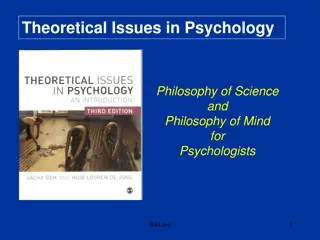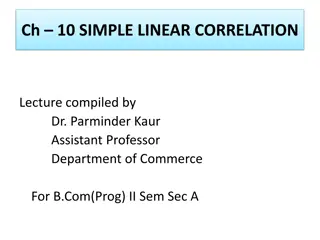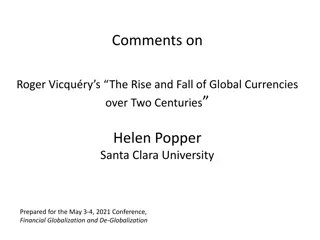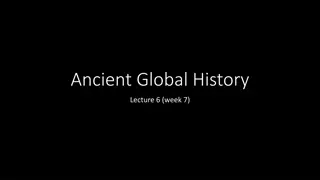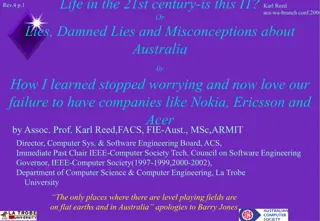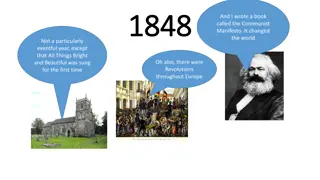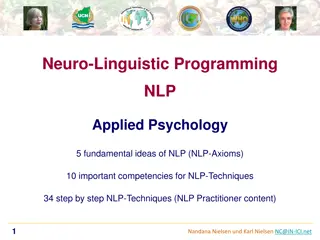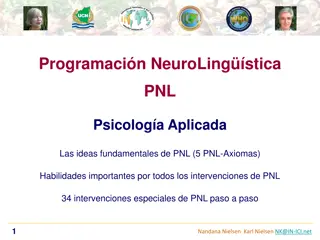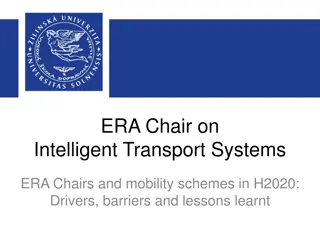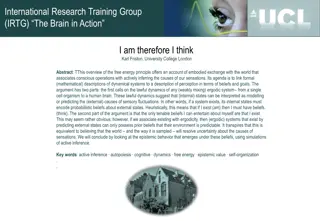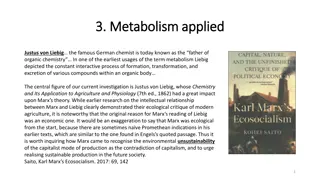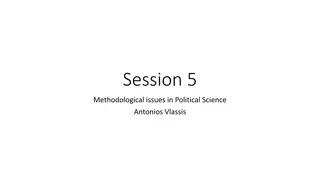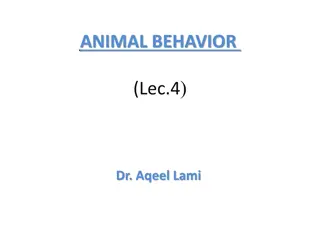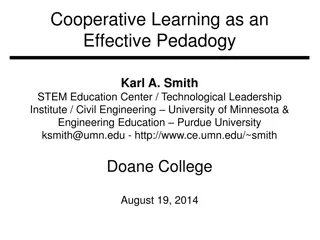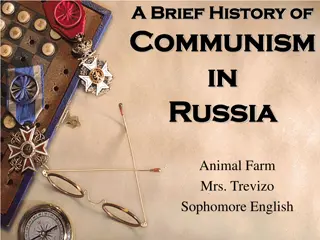Inside Salt Lake City Fire Department: Meet Captain Allen and Crew 11C
Salt Lake City Fire Department is a well-equipped department with 14 fire stations and a dedicated team led by Chief Karl Lieb. Fire Station 11, serving areas including the airport and Pacific Heritage Academy, houses Captain Allen and Crew 11C who are part of the department's educational partnershi
0 views • 25 slides
Perspectives on Reality: Idealism vs. Materialism in Philosophy
Philosophy delves into fundamental questions about existence and reality. This lecture explores contrasting viewpoints of idealism, which posits that reality is mental, and materialism, which argues reality is physical. Examples from philosophers like George Berkeley and Karl Marx exemplify these pe
1 views • 12 slides
Theoretical Issues in Psychology: Philosophy of Science and Mind
Exploring the philosophy of science in psychology, this content delves into key concepts such as positivism, logical positivism, the Vienna Circle, and the scientific process according to positivists. It discusses influential thinkers like Wittgenstein, Popper, Kuhn, and Feyerabend, shedding light o
2 views • 35 slides
Binary Logistic Regression with SPSS – A Comprehensive Guide by Karl L. Wuensch
Explore the world of Binary Logistic Regression with SPSS through an instructional document provided by Karl L. Wuensch of East Carolina University. Understand when to use this regression model, its applications in research involving dichotomous variables, and the iterative maximum likelihood proced
0 views • 87 slides
Understanding Relations of Production in Society
People's need for survival drives them to engage in material production, forming the foundation of human existence. According to thinkers like Karl Marx, the interplay between economic production and social relationships shapes society's structure. The forces of production encompass technological ad
1 views • 7 slides
Understanding Marxism: Principles and Theories Explored
Marxism is a theoretical system developed from the writings of Karl Marx, emphasizing historical materialism, dialectical materialism, theory of surplus value, theory of alienation, and more. It posits that societal structures are determined by economic conditions and that progress evolves through d
0 views • 15 slides
Understanding Marxism and Capitalism
Marxism is a body of social, political, and economic thought derived from the works of Karl Marx and Friedrich Engels, focusing on the analysis of capitalism. Capitalism is an economic system where private individuals own goods and services based on market supply and demand. The purest form of capit
0 views • 25 slides
Understanding Simple Linear Correlation in Commerce: Lecture Compilation by Dr. Parminder Kaur
Correlation analysis is essential in understanding the co-variation between two or more variables. This lecture compiled by Dr. Parminder Kaur, an Assistant Professor in the Department of Commerce, delves into the definition of correlation, types of correlation such as positive/negative, simple/part
0 views • 12 slides
Retrieval Practice in Animal Farm: Lessons on Communism, Allegories, and Propaganda
In this detailed study guide, explore key themes from George Orwell's "Animal Farm", focusing on topics like the Communist Manifesto, bourgeoisie representation, capitalism vs. communism, rhetorical strategies, Karl Marx, fables, anthropomorphism, allegories, Russian Revolution parallels, and the us
1 views • 20 slides
Understanding Chi-Square Test in Statistics
Karl Pearson introduced the Chi-Square (X2) test for statistical analysis to determine experimental consistency with hypotheses. The test measures the agreement between actual and expected counts under the null hypothesis, making it a non-parametric test. It can be applied to various types of variab
6 views • 28 slides
Political Instability of the Weimar Republic: Spartacist and Kapp Putsches
The Weimar Republic faced political instability due to uprisings like the Spartacist and Kapp Putsches, rooted in dissatisfaction with its surrender to the Allies, weak constitution, and failure to address food shortages. The Spartacist Rising of January 1919, led by figures like Karl Liebknecht and
3 views • 18 slides
Karl Marx: The Revolutionary Thinker and Philosopher
Explore the life and theories of Karl Marx, a prominent figure in political philosophy and economics. Discover his works such as "Capital" and "The Communist Manifesto," as well as his theory of history and dialectical materialism. Learn about the impact of technology and power on the mode of produc
0 views • 42 slides
Insights on Global Currencies: Roger Vicquer's Analysis
Helen Popper from Santa Clara University shared insightful commentary on Roger Vicquery's research paper "The Rise and Fall of Global Currencies over Two Centuries" at the Financial Globalization and De-Globalization Conference in May 2021. The discussion delved into control variables, orthogonaliza
0 views • 55 slides
Understanding Chi-Square Test of Significance in Animal Genetics and Breeding
Chi-square test of significance, designed by Karl Pearson in 1899, is widely used in animal genetics and breeding to analyze departures of observed frequencies from expected frequencies. This test helps in assessing goodness of fit, independency in contingency tables, homogeneity of variances, and d
3 views • 25 slides
Understanding the Basic Science Hypothesis and Writing Techniques
Exploring the concept of the basic science hypothesis, its importance in research, and tips for effective hypothesis writing. The scientific method, historical perspectives from Karl Popper to Paul Feyerabend, and the role of serendipity in scientific discoveries are discussed.
0 views • 61 slides
The Axial Age: Pivotal Thinkers Across Ancient Civilizations
The Axial Age, coined by Karl Jaspers, refers to a period from the 8th to 3rd century BCE where pivotal thinkers emerged independently in Persia, India, China, Greece, and Rome, shaping the spiritual foundations of humanity. Jaspers, a German philosopher and psychiatrist, highlighted the importance
2 views • 21 slides
Innovations in Engineering Education: Reflections on Pedagogies of Engagement by Karl A. Smith
Reflections on pedagogical approaches such as Cooperative Learning and Challenge-Based Learning as discussed by Karl A. Smith in the context of transforming higher education towards student-centered learning experiences. Smith emphasizes the shift towards designing effective learning environments an
0 views • 37 slides
Life in the 21st Century: IT, Lies, and Misconceptions about Australia
Delve into Assoc. Prof. Karl Reed's insightful take on the state of life in the 21st century, focusing on the role of IT, misconceptions about Australia, and the failures in developing companies like Nokia and Acer. Explore the impact of technology on society, economy, and workforce, reflecting on t
3 views • 33 slides
Exploring National Identity and Revolutionary Ideals in European History
In this discussion, we delve into Karl Marx's beliefs in the Communist Manifesto, the lack of Communist revolutions in the 19th century, the role of national identity in societies, and the concept of imagined communities as outlined by Benedict Anderson. Through analyzing historical events and schol
2 views • 10 slides
Insights into Garment Printing Industry Trends
Explore the evolution of garment printing businesses like PoPATL and AnaJet, the impact of DTG technology, marketing strategies, and operational efficiencies. Learn about key players like Karl Tipre and PoPATL founders Brian Wynder and Charlie Bunkley.
0 views • 42 slides
Mastering Neuro-Linguistic Programming (NLP) Fundamentals and Techniques
Explore the core concepts of Neuro-Linguistic Programming (NLP) through a comprehensive guide covering essential NLP axioms, competencies, and step-by-step techniques. Authored by Prof. Nandana Nielsen and Prof. Karl Nielsen, this resource introduces the origins of NLP, key principles, and practical
0 views • 52 slides
Comprehensive Overview of Neuro-Linguistic Programming (NLP) Fundamentals
Dive into the core concepts of Neuro-Linguistic Programming (NLP) with a focus on the essential ideas, skills, and interventions. Learn about the 5 key axioms, important techniques, and step-by-step instructions for various NLP interventions. Developed by Nandana Nielsen and Karl Nielsen, this guide
0 views • 52 slides
The Rise of Communism in Russia: Key Figures and Events
Russia's transition to communism was marked by social and political upheaval, with figures like Karl Marx, Lenin, Trotsky, and Stalin playing pivotal roles. The Russian Revolution, civil war, and the rise of the Soviet Union reflected a shift towards communist ideology, leading to significant change
0 views • 37 slides
Perceptions of Borders Among Young Mobile Europeans in Europe
This research delves into the perceptions of borders by young mobile Europeans within Europe, exploring how these constructs impact their daily lives. The study investigates the concept of a borderless Europe facilitated by the EU's free movement of persons policy, shedding light on differences and
0 views • 18 slides
Analyzing Hurricane Karl (2010): Doppler Radar Insights
Detailed analysis of Hurricane Karl (2010) using Doppler radar and WRF simulations, focusing on precipitation patterns over Mexican terrain and underlying processes. Includes NASA and NOAA grants, airborne radar measurements, WRF simulations, flight tracks, and velocity distributions comparison betw
0 views • 19 slides
Intercept X Early Access Program: Sophos Tester Overview
The Intercept X Early Access Program encompasses the Sophos Tester, a tool designed by Karl Ackerman, Principal Product Manager of Endpoint Security Group, in July 2017. This tool allows users to demonstrate attack techniques without harming their PCs. It is safe to use and functions with Intercept
0 views • 16 slides
Understanding Marxist Theory: Key Concepts and Implications
The Marxist theory, rooted in Karl Marx's philosophy, emphasizes the control of means of production as a determinant of societal power dynamics. This ideology examines economic power, materialism versus spirituality, class conflict, and the role of art, literature, and ideologies in shaping culture
0 views • 17 slides
Critical Analysis of a Play: Examining Themes and Characters
Explore the complex themes of money, decision-making, and community responsibility through a detailed examination of a play. Dive into the thought-provoking questions posed and analyze the characters' perspectives on happiness, generosity, and individual responsibilities in the community. Delve into
0 views • 10 slides
Advancing Intelligent Transport Systems Through ERA Chair Program
The ERA Chair program focusing on Intelligent Transport Systems (ITS) has significantly impacted research and innovation at the University of Zilina. Driven by key personnel like Dr. Karl Ernst Ambrosch, Dr. Dietrich Leihs, and Prof. Tatiana Kovacikov, the initiative has led to enhanced internationa
0 views • 19 slides
Reflections on Mortality in "Auto Wreck" by Karl Shapiro
The poem "Auto Wreck" vividly describes the aftermath of a car crash, highlighting the chaotic scene and the emotional reactions of witnesses. It delves into the unsettling nature of death, contrasting the randomness of the crash with the more understandable forms of mortality like war, suicide, sti
0 views • 46 slides
The Free Energy Principle and Active Inference in Cognitive Dynamics
This overview of the free energy principle by Karl Friston delves into how conscious operations are linked to inferring causes of sensations, emphasizing the necessity of probabilistic beliefs about external states. The discussion includes topics like embodied exchange with the world, ergodic system
0 views • 32 slides
Understanding Action and Perception through Minimization of Prediction Error
This talk by Karl Friston delves into how our interaction with the environment can be explained by the minimization of surprise or prediction error. It explores the role of predictive coding in perception and motor reflexes in action, showcasing phenomena like hierarchical brain messaging and percep
0 views • 25 slides
Justus von Liebig: Father of Organic Chemistry and Environmental Visionary
Justus von Liebig, known as the father of organic chemistry, pioneered the concept of metabolism and its implications for agriculture, society, and the environment. His work influenced Karl Marx's ecological critique of modern agriculture and highlighted the necessity for sustainable production prac
0 views • 6 slides
Understanding Classical Marxism: Key Concepts and Critiques
Marxism, rooted in the ideas of Karl Marx, emphasizes the significance of economic relations in shaping social and political structures. Classical Marxism focuses on economism, determinism, materialism, and structuralism, viewing history through a lens of class struggle and offering an emancipatory
0 views • 21 slides
Insights into Animal Behavior and Hormones
Explore the fascinating world of animal behavior, from the deception of recognition mechanisms in gulls to Karl von Frisch's experiments on fish sensory abilities. Learn how behavioral assays shed light on animal sensory powers and how hormones play a crucial role in regulating animal behavior. Disc
0 views • 6 slides
Exploring the Foundations of Missional Theology
Tracing its theological roots to Karl Barth and popularized by Lesslie Newbigin, Missional Theology emphasizes the church's participation in God's mission to restore creation. Centered on the Triune nature of God, Christology, and Pneumatology, it delves into Anthropology, Hamartiology, and Soteriol
0 views • 42 slides
Managing Farmland Nitrogen Emissions: Strategies and Research Updates
Soils play a crucial role in greenhouse gas emissions and carbon sequestration. Karl Richards, Head of Soils, Environment & Land-Use Department at Teagasc, discusses the importance of managing farmland nitrogen emissions through various practices. Research focuses on reducing emissions and enhancing
0 views • 8 slides
Enhancing Learning Through Cooperative Pedagogy
Explore the effective pedagogy of cooperative learning with Karl A. Smith. Understand essential student learning outcomes, session layout, overall goals, workshop objectives, and engage in reflection and dialogue to enhance educational practices. Discover key elements and strategies for facilitating
0 views • 67 slides
A Brief History of Communism: From Capitalism to Karl Marx's Vision
The history of communism traces back to the capitalist system's exploitation of workers in the mid-1800s. Karl Marx's vision, outlined in "The Manifesto of the Communist Party," aimed for economic equality and worldwide revolution. The inherent flaws of capitalism were critiqued, leading to the rise
0 views • 17 slides
Dr. Karl Marx A. Quiazon - Expert in Aquatic Biosciences and Fisheries Management
Dr. Karl Marx A. Quiazon is a highly accomplished academic and researcher in the field of aquatic biosciences and fisheries management. With a Ph.D. from the University of Tokyo, Japan, he has extensive experience in fish diseases and aquaculture. He has held various academic positions in the Philip
0 views • 15 slides


